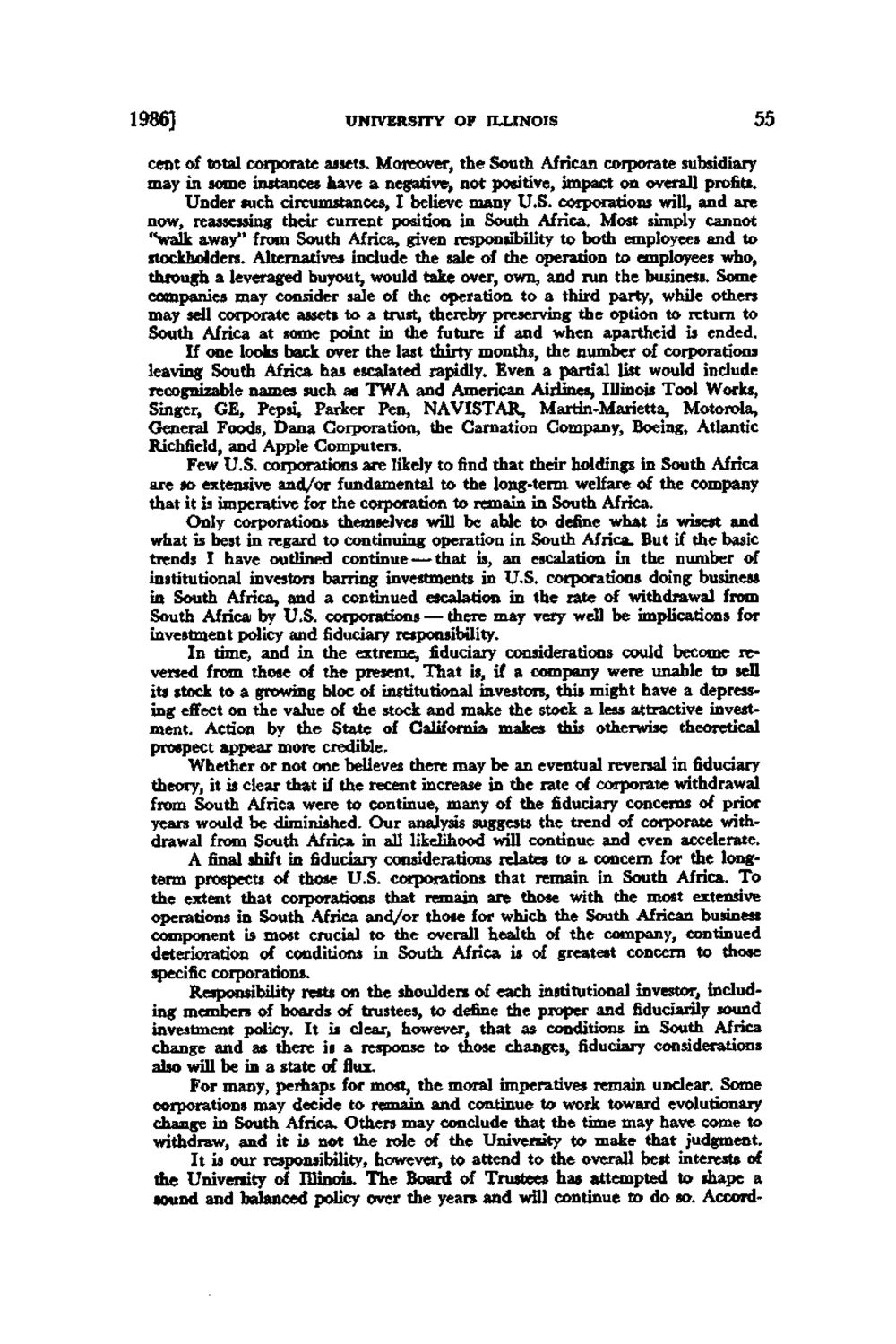| |
| |
Caption: Board of Trustees Minutes - 1988
This is a reduced-resolution page image for fast online browsing.

EXTRACTED TEXT FROM PAGE:
1986] UNIVERSITY OF ILLINOIS 55 cent of total corporate assets. Moreover, the South African corporate subsidiary may in some instances have a negative, not positive, impact on overall profits. Under such circumstances, I believe many U.S. corporations will, and are now, reassessing their current position in South Africa. Most simply cannot "walk away" from South Africa, given responsibility to bodi employees and to stockholders. Alternatives include the sale of the operation to employees who, through a leveraged buyout, would take over, own, and run the business. Some companies may consider sale of die operation to a third party, while others may sell corporate assets to a trust, thereby preserving the option to return to South Africa at some point in die future if and when apartheid is ended. If one looks back over the last thirty months, the number of corporations leaving South Africa has escalated rapidly. Even a partial list would include recognizable names such as TWA and American Airlines, Illinois Tool Works, Singer, GE, Pepsi, Parker Pen, NAVISTAR, Martin-Marietta, Motorola, General Foods, Dana Corporation, the Carnation Company, Boeing, Atlantic Richfield, and Apple Computers. Few U.S. corporations are likely to find that their holdings in South Africa are so extensive and/or fundamental to the long-term welfare of the company that it is imperative for the corporation to remain in South Africa. Only corporations themselves will be able to define what is wisest and what is best in regard to continuing operation in South Africa. But if the basic trends I have outlined continue — that is, an escalation in the number of institutional investors barring investments in U.S. corporations doing business in South Africa, and a continued escalation in the rate of withdrawal from South Africa by U.S. corporations — there may very well be implications for investment policy and fiduciary responsibility. In time, and in the extreme, fiduciary considerations could become reversed from those of the present. That is, if a company were unable to sell its stock to a growing bloc of institutional investors, this might have a depressing effect on the value of the stock and make the stock a less attractive investment. Action by the State of California makes this otherwise theoretical prospect appear more credible. Whether or not one believes there may be an eventual reversal in fiduciary theory, it is clear that if the recent increase in the rate of corporate withdrawal from South Africa were to continue, many of the fiduciary concerns of prior years would be diminished. Our analysis suggests the trend of corporate withdrawal from South Africa in all likelihood will continue and even accelerate. A final shift in fiduciary considerations relates to a concern for the longterm prospects of those U.S. corporations that remain in South Africa. To the extent that corporations that remain are those with the most extensive operations in South Africa and/or those for which the South African business component is most crucial to the overall health of the company, continued deterioration of conditions in South Africa is of greatest concern to those specific corporations. Responsibility rests on the shoulders of each institutional investor, including members of boards of trustees, to define the proper and fiduciarily sound investment policy. It is clear, however, that as conditions in South Africa change and as there is a response to those changes, fiduciary considerations also will be in a state of flux. For many, perhaps for most, the moral imperatives remain unclear. Some corporations may decide to remain and continue to work toward evolutionary change in South Africa. Others may conclude that the time may have come to withdraw, and it is not the role of the University to make that judgment. It is our responsibility, however, to attend to the overall best interests of the University of Illinois. The Board of Trustees has attempted to shape a sound and balanced policy over the years and will continue to do so. Accord-
| |